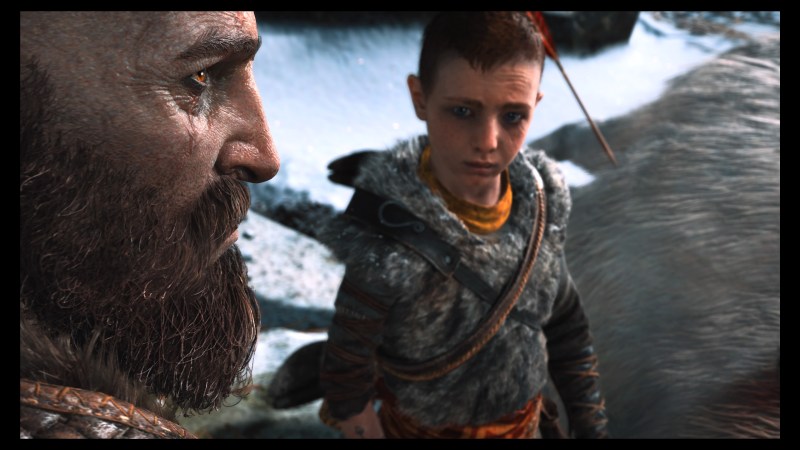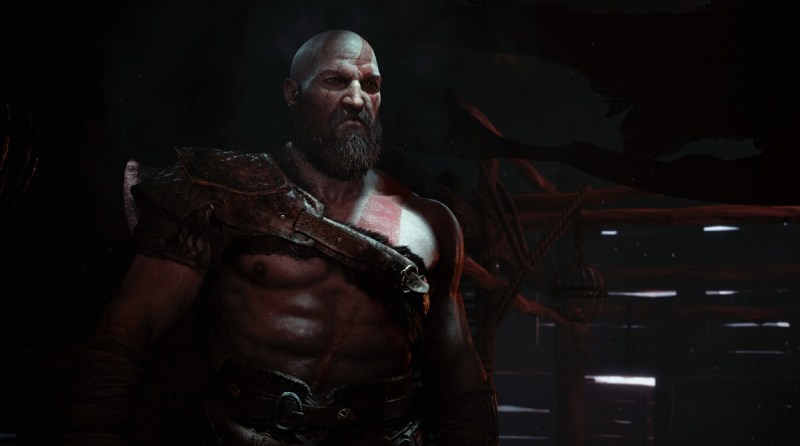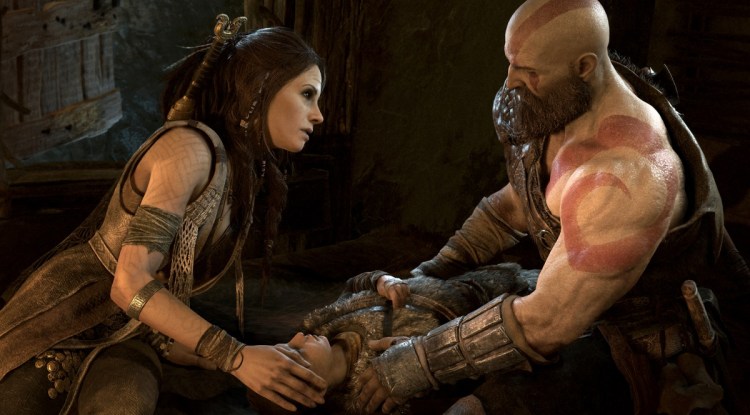GamesBeat: One point it got across was that this isn’t a very graceful, polite dad. “Don’t be sorry. Be better.”
Barlog: That took a lot to get to. We went through so many revisions. Matt Sophos and Rich Gaubert were the writers and directors on Lost Planet 3. Say what you want about the reception, the writing and the character development on that game was absolutely brilliant. So good. When Rich came to work for us, he had suggested, “Hey, Matt, the other writer on there is really good. We should bring him in.” We took him to lunch and I convinced him to come on.
They had some really hard times. All three of us, to get that first opening section—it turned out that was something we worked on early. That became our vertical slice, our greenlight, and the beginning of the game. We didn’t intend that it would be the beginning of the game. We were just trying to find the voice of Kratos. But man, people hated it, hated it with a passion, on the team. Our first seven goes at it. One person wrote a really long email to us saying that this game felt like a child abuse simulator. Because we were trying to find Kratos. We didn’t want him to be too soft, but it turned out he was way too mean. Way too mean. Then we overcorrected, and we had somebody else read the temp dialogue. They said, “He sounds like Qui-Gon Jinn. He’s so calm. This is terrible.”
The needle kept going back and forth until we honed in on it. There it is. It was almost the same dialogue. That’s the interesting part. Moving things around, cutting things down, shading a few bits, and also finding the right read, so that it doesn’t feel angry all the time—for a good six to eight months people said it was depressing to play our game, because Kratos is such a jerk. They hated him. All right, that’s not good. We wanted it to feel true to Kratos, but it can’t be that hardcore.

Above: Kratos: Don’t be sorry. Be better.
GamesBeat: I felt like the end was good. It reflected a lot of that thinking. Again, it was tightly woven. You go back and you realize—like, why is he calling him “boy,” in that insulting way? Or even the fact that you’re somehow drawing attention to how Kratos doesn’t call him by his name. Were you trying to hide his identity, even that early?
Barlog: It’s a very interesting story about that one. This is the beautiful thing about the agility of storytelling, and being agile when you’re writing and directing something. Initially the plan was, the name would be the reveal. At the end of the game, even calling his son by his name, thus acknowledging and accepting him. Then we realized that probably wasn’t the right thing. But I was also using “boy” because I couldn’t think of a name.
The first stab at it, he was just going to call him by his regular name. But then we thought we had this great idea. What if he only refers to him by name at the end? That’s good, because it gives me more time to stall and come up with the name. Then we realized that’s not the right beat. At the end of the game he has to accept him as his son. That has to be the first time he says “son.” Because that’s so charged. It’s what Zeus used when Kratos killed him. He calls him “my son.”
That’s so emotionally charged for him that he doesn’t want to do that. He doesn’t want to acknowledge this kid, even though he’s important to him. The kid represents a second chance for him, but he’s still not ready to open up to him. But yeah, I didn’t have the name Atreus, I think, until probably a week before we released it in the metadata of the music tracks. I waited until the last minute.
We had so many names, hundreds of names, and I really liked Atreus. Everyone realized I was a fan of the Neverending Story and they said, “But it’s just like Atreyu.” And I said, “No, it’s a cool reference. It’s also a great mystery. People will think he’s named after the mythological Atreus and they’ll all go in that direction.” Because that’s not really the story of where he comes up with the name. Whatever name we choose, it’s going to be a soldier that Kratos served with. It’s going to be a personal thing for him. We had a name that kind of has a connection with Greek mythology, and everyone would start reading into it, all these different things.

Above: Cory Barlog is … Kratos.
GamesBeat: You had your own son. I wonder how much you see your relationship with him in this game.
Barlog: So much. There’s so much of this—the way that Kratos views godhood, as a disease he’s passed on to his kid, is the same concept I look at my kid, with my own psychological idiosyncrasies, my own obsessive-compulsive nature. He’s exhibiting all of that. I gave him that, because my wife is not that way. My wife has anxiety, but she’s nowhere near that—everything has to be done in a certain order, and my kid is that times 1,000, which is so heartbreaking. It’s the same way that–in that moment when Atreus rages out at the end of the game and knocks himself out and nearly dies. It’s seeing that terrible part of yourself in your kid.
Moments throughout the game are pulled from my interactions with him, and my interactions with my dad. Matt and Rich both have kids, so their interactions. So many people on the team, they would tell us stories about interactions with their childrens or their parents. These little stories would find their way in. That’s really interesting. The test for us was—all three of us sitting around, we’d say, “Somebody told me this story today.” And if all three of us said, “Oh, I can relate to that,” we’d feel like we could have more people relate to it. It’s something universal.
There were some things we put in and it didn’t work out. People would say, “I don’t get that at all.” All right, we’ll take that out.
GamesBeat: You build a lot of that thinking into some of the dialogue, and then you may have actors coming in and changing it.
Barlog: But that’s good. There are so many times where they just bring something that surprises me. I had to get more flexible with the idea that I’m doing seven-minute takes with six actors and one of them is nine years old. It’s hard to say, “Well, one actor said this one part of that take wrong.” So I automatically went into all the shoots being open to the idea of, “That was really good. A bit more of that.” But acknowledging that I can’t stitch all of this stuff together. I can do a bit here and there, but I’m looking for that perfect seven-minute take between everyone. Empowering the actors even more to own it a little bit, and giving them direction that’s a bit more focused on finding what they already know to be true, but just getting it out in the lines.
I figured out a different way to work with everybody and direct, because of that. Because literally, one camera shot in a cinematic means you can’t just say, “Oh, that’s fine, we’ll get it in the coverage. We’ll do close-ups and you can nail it there.” Everyone has to give a perfect performance, every single time. The more invested and owned they are of it, the better a performance you get. It’s amazing.

